Raising Cornish-Cross Meat Birds: Week 5
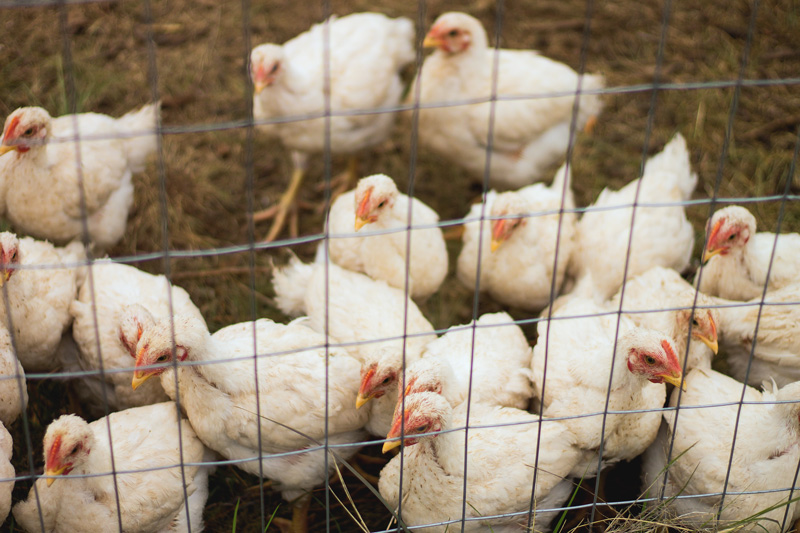
The last couple of weeks on the homestead have held some loss. That is sort of the way of things when you are trying to grow living plants and animals but still, it can often be a sharp reminder of the fragility of it all.
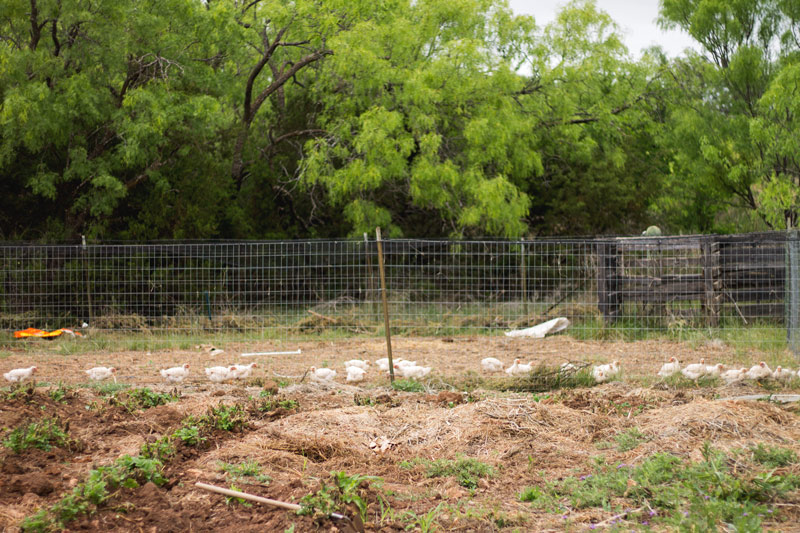
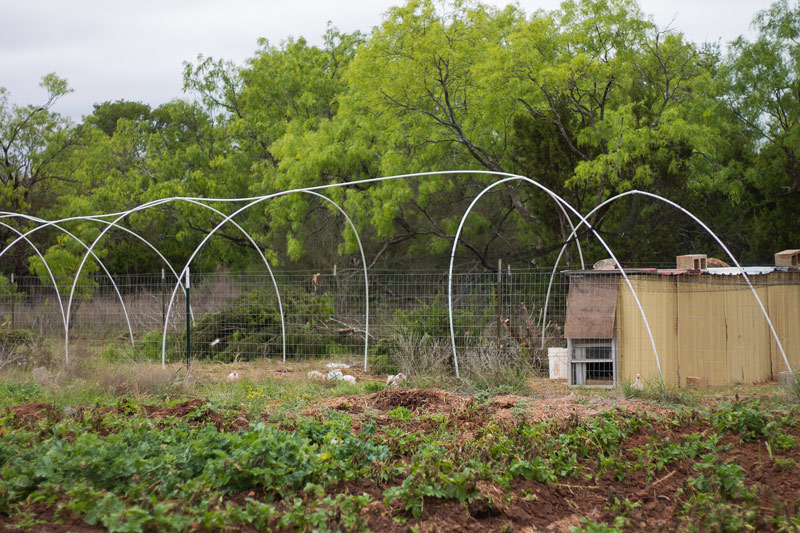
The loss we incurred with the meat birds really wasn’t that significant and we are thankful it wasn’t worse than it was. At last count I believe we have around 37 of the 40 birds left. Early one morning, just as the sun was coming up, I walked out to let the birds out and feed them only to discover we’d forgotten to put the roof on the house the night before. An owl – a very brazen owl, I might add – was perched on the edge of the house with a chick in its grasp. It stared at me for what seemed like ages before it took off with its morning meal. Another bird was found dead a couple of days later and we suspect a hawk. There is no accounting for the third lost chicken; either I’ve miscounted or there is no evidence.
So Stewart has been putting some netting above their run.
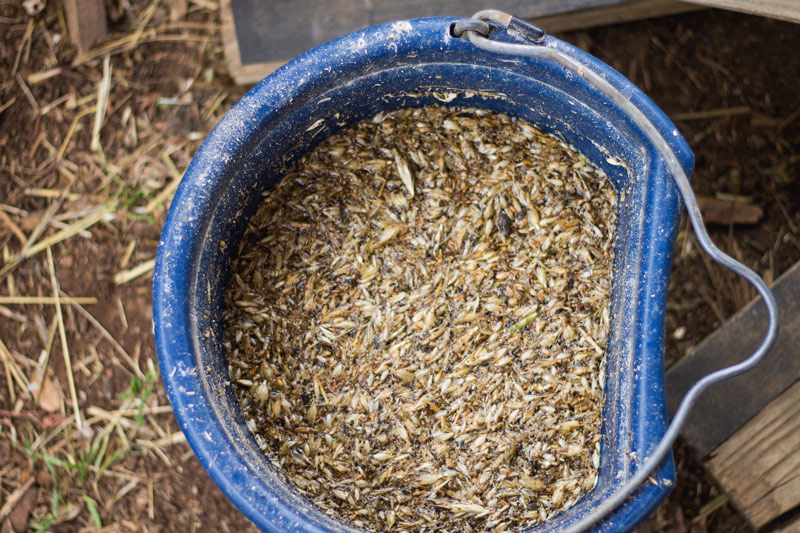
They are completely on fermented grain and skim milk now. I’ve ground that wet fermented grain up until this past week and now I am introducing whole, wet, fermented grain. And they get a gallon – plus or minus – of skimmed milk per day which they seem to really like.
I did some very rough math in talking to Stewart about it and we think the savings is well over 50% by feeding them this way. Then again, it might take them longer to grow so who knows.
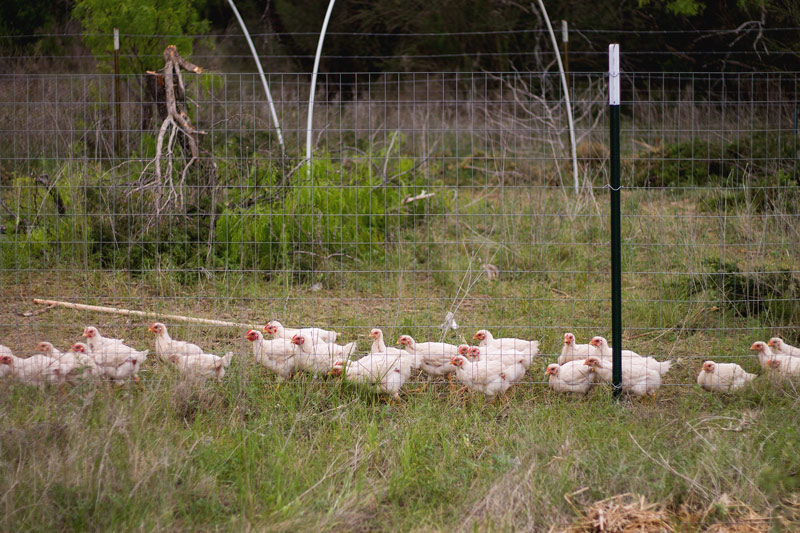
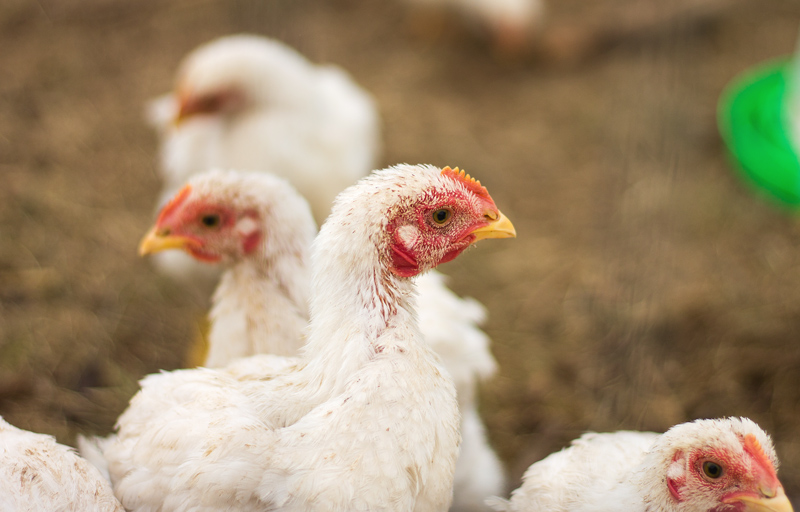 But the birds seem to be growing rapidly still and we’ve seen no indication of health problems… except the one whose leg we accidentally stepped on. But he is recovering (the chicken that is) so we are grateful for that too.
But the birds seem to be growing rapidly still and we’ve seen no indication of health problems… except the one whose leg we accidentally stepped on. But he is recovering (the chicken that is) so we are grateful for that too.
We really have no set goal as far as how many weeks we will allow them to grow before butchering starts. We have a hog to butcher first and, so long as the birds are healthy, could see going another five or more weeks before pulling out the ax and the chopping block. Until then, it’s just a matter of feeding these constantly hungry guys and keeping them from predators.
And we wanted to thank you all for the great tips and shared experience you’ve given us in the comments of the previous posts. It’s been very helpful for these first-time Cornish-Cross raisers!

I hope you have seen the last of your losses. We have a huge predator bird population in our area (hawks, eagles, owls). We learned really quickly that hawks and owls are as persistent as a raccoon or a fox, so we secured everything from ground up and over the hens’ run. The other morning, I was getting my tools together to plant some pepper plants that we had starting from seed a little later than the others and I kept wondering why the ladies weren’t out scratching around in the compost pile that is located in their run; it’s covered as well. I walked over to the pen and a hawk was walking around the run, looking for a way in…walking! I was so mad but very happy my son and husband had secured everything for me.
I always help my daughter butcher her hogs and it is hard work. My son and son-in-law do the heavy part but even with their help, I am sore for days following. I have my grandmother’s meat grinder, and we use it to make sausage but my grandkids are still young enough to enjoy turning the crank. This year, my husband and son-in-law have added a smoke house to my daughter’s little farm. She had been sending hams and other meat out to smoke and I remembered how my grandparents smoked everything in their smoke house so we did a little research and have already smoked fish in it and ham, ham hocks, and some bacon. We only eat the fish but the other meats my children and their children all agree were better than store bought smoked meats.
We lost three tomato plants during the last frost. We had read on the weather website that the frost would be light and brief, so I didn’t cover the plants. I knew I had made a mistake that morning when I saw ice on our car windows. Fortunately, we only lost three. I have been retired now for almost two years and have been raising the things we eat as much as I can.
This year, my daughter has bought a milk cow; I bought a goat that produces a huge amount of milk so that I have enough to make cheese, but I have been enjoying the fresh cow’s milk and happy that I no longer have to pay for the milk from our local dairy. We don’t drink milk but I do make yogurt, cheese, and butter from the cow’s milk and cheese from the goat’s milk.
There is something, I think, that happens when we simplify our life, including the foods we eat. I think some of it is the loss of guilt that happened every single time I opened a can of something, or a package of cheese, or butter and had all the aluminum, paper, plastic, cardboard waste going into the landfill. Because we make so much of the things we used to buy, we no longer have all that packaging. And, knowing that I control what my family eats and none of the harmful chemicals from food colorings and preservatives enter into the foods I can, ferment, jelly, dry, etc. has given me control and power that I needed. Before if I didn’t like the ingredients, I had no choice, now I don’t put those ingredients into the things I prepare and it is teaching my grandchildren that we don’t have to live a disposable life nor do we need to forget the sacrifices that animals make for our benefit. I am so sorry that I have rambled on but I believe that everything we do no matter how small or how grande our efforts are, the impressions we leave influences the lives of our future children.
The first year we had chickens, we bought white (don’t remember the breed). The hawks used them for target practice. I’m sure we were known as Chik-Fil-A in the predator community. Now we buy darker feathered birds, and we lose fewer to the hawks’ murderous tendencies. I know they have to eat, but they’re cheating when they take chickens, in my opinion.
We too are raising the Cornish. We have 64 birds plus 10 red Rangers. How much feed are you giving per day if you don’t mind me asking? We are letting ours range and restricting feed and only feeding a few times a day versus a feeder all day. Ours are about 6 weeks old and nowhere near as large as what I see online. I’ve yet to find anyone doing it like this. We give organic feed too. We plow up the field a few times a evening to give them worms as well. They all come running now when they hear the tractor with the plow start up. Thanks kindly
Erica
Hi Erica,
Sorry for the delay in responding!
We feed 2-3 times per day. The morning and evening feeds are approximately 1 gallon of dried grain soaked or fermented. We then give about 3/4 gallon of skimmed milk plus any kitchen scraps around mid-day. I hope to do an update soon, but we’ve noticed their growth slowing down and certainly slower than those who feed more rigorously than we are. I believe we probably won’t butcher until at least a month from now so maybe 12-14 weeks? I wonder if we aren’t having similar experiences in terms of them being smaller than those who feed more frequently.
Thanks! Yes, ours are still growing slowly. We had to butcher one today because something happened to it’s leg. These crazy guys love to roost so I think it fell and hurt itself. It wouldn’t move at all. Anyway completely butchered it was just over 2.8 pounds. It was 4 pounds live Weight and they are 8 weeks old on Saturday. There are a few 5 pounders but some are smaller too about 2-3 pounds! The red Rangers who are the same age are bigger and they never want to eat. They only want to range. They walk away from their feed so this will be an interesting experiment. My husband thinks we will stick with the Rangers from now on but we will see at the end of butcher what our decision will be. But the meats do smell sooo much worse then the Rangers!
God bless